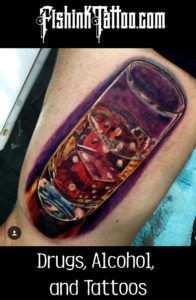We have all heard stories about people waking up the morning after a bender with a tattoo they don’t remember getting. It is so common that it has become a joke. Sadly, this is a preconception that is no laughing matter.
There are many problems with getting tattooed while under the influence of drugs or alcohol. One of the big issues is a combination of legality and ethics. If you are obviously inebriated, you are not in the proper mindset to make a decision that will affect the rest of your life. You also cannot legally sign the liability waiver and consent form that all shops should have. While that tattoo of Bowser, wearing sunglasses, wailing on a double-necked guitar, on a surfboard, with a pot-leaf, and a cross, that says “Happy Birthday Rick” may seem like a great idea when you are hammered, you will surely regret it in the morning. Most shops will turn you away if you are drunk or high although there are some shops that only care about getting your money, rather than you getting a quality tattoo.
If you have been drinking alcohol within 24 hours prior to getting your tattoo, it will increase the amount you will bleed during the tattoo. The more you have drank, the worse it will be. It is one thing if you had a glass of wine with dinner last night or a beer with lunch. It is something totally different if you were doing keg stands the night before or slammed down four or five shots at the bar across the street on your way in. If you have to go partying on the weekend, maybe you should get tattooed during the week.
Now we get to talk about drugs. I am not going to lecture about the evils of drugs. There is plenty of that in the world. I am going to talk about them in relation to tattoos and why you may get denied service if you are on them. To start off, I think we need to break this down into two categories, medication and recreational drugs.
Medications include anything that you can buy at a pharmacy, whether it is available with or without a prescription. Many people think that if you can just walk into a pharmacy and buy it over the counter, it is no big deal. Not true in regard to tattoos. Many over the counter pain killers including aspirin can cause an increase in bleeding. Some older people are told to take low dose aspirin every day so that it thins their blood. Guess what, regular dose aspirin does the same thing and will thin it right out of your tattoo, taking ink with it. There are prescription meds such as Coumadin that does the same thing. Something to think about before getting tattooed.
 Any medication that affects your skin can also affect your tattoo. Accutane is one of the medications that can cause major problems with your tattoo. Dermatologists tend to recommend waiting at least six months before any procedure that involves breaking the skin. This includes tattoos. The process in which this medication works can lead to severe scarring in the tattoo. If you are on it, please wait until you have been off of it for at least six months. If you are on a medication regimen that may cause a potential problem during or after your tattoo, it is always best to check with your doctor. While some doctors may not approve of tattoo, they should still tell whether it is contraindicated with your medications.
Any medication that affects your skin can also affect your tattoo. Accutane is one of the medications that can cause major problems with your tattoo. Dermatologists tend to recommend waiting at least six months before any procedure that involves breaking the skin. This includes tattoos. The process in which this medication works can lead to severe scarring in the tattoo. If you are on it, please wait until you have been off of it for at least six months. If you are on a medication regimen that may cause a potential problem during or after your tattoo, it is always best to check with your doctor. While some doctors may not approve of tattoo, they should still tell whether it is contraindicated with your medications.
Recreational drugs include two different types, street drugs and prescription drugs that are not prescribed for this problem. Most street drugs such as cocaine and meth will cause issues with bleeding as well as the client keeping still during the tattoo, not to mention impaired judgment. Marijuana will not cause you to bleed more does have its own interesting reaction to the tattoo process. It may relax you prior to the tattoo, once the needle touches skin, the high goes away. Some people have stated that the tattoo actually hurt more after smoking.
As previously stated, prescription drugs fall in to both categories. The pills that are most commonly abused can also lead to a bad experience. Painkillers like Vicodin, Oxycontin and Percocet may seem like a good idea to take the edge off but it can also lead to bad reactions. There have been cases where people tried to make it through marathon sessions with the help of a pill bottle and wound up overdosing. Anti-anxiety drugs such as Valium or Xanax are some of the common ones I have heard people talk about using. One of the big problems with these meds is the sedation effect that can cause you to miss important information such as proper aftercare. Next time you are in, ask about the girl who used yeast infection medicine on her tattoo because she popped a couple Xanax in her car on her first smoke break. Ewww.
Basically, if you smell like alcohol or a head shop, are slurring your words, having difficulty staying upright or are belligerent, you will be politely asked to leave and come back when you are not under the influence.
Thanks for taking the time to read this information and I hope it will help you prepare for your next tattoo. I hope to see you soon.

